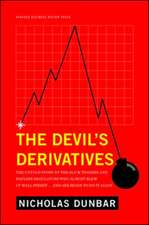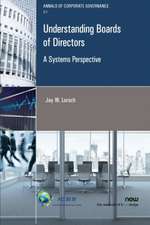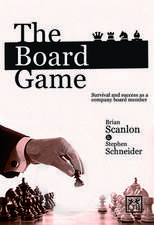The Modern Corporation and Private Property
Autor Adolf A. Berleen Limba Engleză Paperback – 30 ian 1991
| Toate formatele și edițiile | Preț | Express |
|---|---|---|
| Paperback (1) | 343.32 lei 3-5 săpt. | +29.07 lei 7-13 zile |
| Taylor & Francis – 30 ian 1991 | 343.32 lei 3-5 săpt. | +29.07 lei 7-13 zile |
| Hardback (1) | 1009.74 lei 6-8 săpt. | |
| Taylor & Francis – 28 sep 2017 | 1009.74 lei 6-8 săpt. |
Preț: 343.32 lei
Nou
65.69€ • 68.59$ • 54.37£
Carte disponibilă
Livrare economică 14-28 martie
Livrare express 28 februarie-06 martie pentru 39.06 lei
Specificații
ISBN-10: 0887388876
Pagini: 434
Dimensiuni: 152 x 229 x 28 mm
Greutate: 0.69 kg
Ediția:Revised
Editura: Taylor & Francis
Colecția Routledge
Locul publicării:Oxford, United Kingdom
Cuprins
Descriere
This monumental work on the corporation is one of those enduring classics that many cite but few have read. Graced with a new introduction by Weidenbaum and Jensen, this new edition makes this classic available to a new generation. Written in the early 1930s, The Modern Corporation and Private Property remains the fundamental introduction to the internal organization of the corporation in modern society. Combining the analytical skills of an attorney with those of an economist, Berle and Means raise the central questions, even when their answers have been superseded by changing circumstances.
The book's most enduring theme is the separation of ownership from control of the modern corporation and its consequences. Berle and Means display keen awareness of the divergent interests of directors and managers, and of each from owners of the firm. Among their predictions are the characteristic increase in size of the modem corporation and concentration of the economy. The authors view stock exchanges and stock markets as essential by-products of the rise of the modem corporation, and explore how these function. They address the difficult questions of whether corporations operate for the benefit of owners or managers, and explore what motivates managers to make effective use of corporate assets. Finally, they examine the role of the corporation as the prevailing form of organizing the production and distribution of goods and services.
In their new introduction, Weidenbaum and Jensen, co-directors of the Center for the Study of American Business at Washington University, critically assess the impact of developments not fully anticipated by Berle and Means, such as the rise of the service sector, and the significant role played by institutional investors in the owner/manager equation. They note the authors' prescient observations, including the complex role of and motivating influences on professional managers, and the significance of inside information on stock markets. As they note, The Modern Corporation and Private Property remains of central value to all those concerned with the evolution of this major social institution of the twentieth century. Scholar and practitioner alike will find it of enduring significance.


























